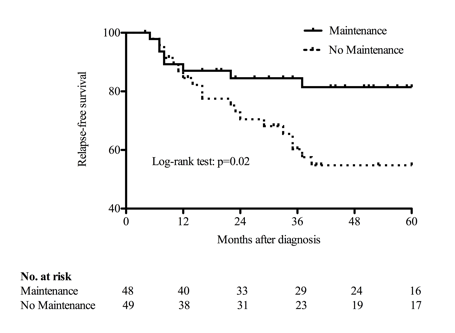Session Information
Session Type: ACR Concurrent Abstract Session
Session Time: 2:30PM-4:00PM
Background/Purpose: To evaluate the effect of maintenance therapy on the outcomes of adult patients with primary angiitis of the central nervous system (PACNS).
Methods: We analyzed long-term outcomes (relapse, survival and functional status) of adult patients enrolled in the French multicenter cohort of PACNS who achieved remission under induction treatment and with at least 12 months of follow-up (or who died earlier after having achieved remission), according to whether or not they received maintenance therapy. Good functional outcome was defined as a modified Rankin scale (MRS) inferior or equal to 2 at last news.
Results: Ninety-seven patients [46 (47%) female, median age: 46 [18-78] years-old at diagnosis] were included and followed for a median of 55 [5-198] months. Induction treatment consisted of glucocorticoids (GC) in 95 (98%) patients, combined with an immunosuppressant in 80 (83%), mostly cyclophosphamide (CYC, median of 6 [2-12] pulses for 6 [2-10] months). Maintenance therapy was prescribed in 48 (49%) patients, including 42 with previous CYC treatment. Azathioprine (AZA), mycophenolate mofetil (MMF) and methotrexate (MTX) were chosen in 38, 4 and 6 patients, respectively. Maintenance therapy was started 4 [2-18] months after GC initiation and was prescribed for a median duration of 24 [6-72] months. Thirty-two (33%) patients relapsed, 4 of whom died. At last follow-up, patients who had received maintenance therapy, compared to those who did not, had better median MRS (1 [0-6] vs. 3 [0-6], p<0.0001) and had less disease relapse (10 (22%) vs. 22 (45%), p=0.01; Figure 1). At the time of relapse, 6/10 of the former patients had stopped maintenance therapy (3-6 months before). In multivariate analysis, maintenance therapy was the strongest predictor of good functional outcomes (OR = 8.17 [3.03—24.91], p<0.0001), and had a protective effect against relapse (OR=0.23 [0.07—0.67], p=0.01).
Conclusion : The results of this long-term follow-up study suggest that maintenance therapy in patients with PACNS improves functional outcomes and lowers relapse rate. It should thus be prescribed after induction treatment. Figure 1. Kaplan-Meier curves of relapse-free survival in patients with primary angiitis of the central nervous system, according to whether or not they received maintenance therapy. 
To cite this abstract in AMA style:
de Boysson H, Arquizan C, Boulouis G, Gaillard N, Regent A, Néel A, Detante O, Touzé E, Aouba A, Bienvenu B, Guillevin L, Naggara O, Zuber M, Pagnoux C. Maintenance Therapy Improves Long-Term Outcomes in Patients with Primary Angiitis of the Central Nervous System [abstract]. Arthritis Rheumatol. 2016; 68 (suppl 10). https://acrabstracts.org/abstract/maintenance-therapy-improves-long-term-outcomes-in-patients-with-primary-angiitis-of-the-central-nervous-system/. Accessed .« Back to 2016 ACR/ARHP Annual Meeting
ACR Meeting Abstracts - https://acrabstracts.org/abstract/maintenance-therapy-improves-long-term-outcomes-in-patients-with-primary-angiitis-of-the-central-nervous-system/
